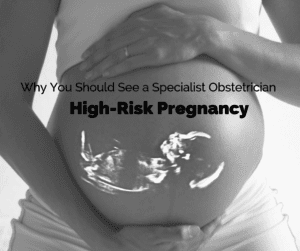A high-risk pregnancy refers to a type of pregnancy that requires special care in order to have a successful delivery. This kind of pregnancy is often associated with factors such as chronic illnesses or other conditions that put your pregnancy at risk.
Also, note that you can have a normal pregnancy in the beginning, only to develop some ailments that will put you in the high-risk category. The role of an obstetrician is to help manage these conditions that can affect you and the baby throughout the pregnancy, during the delivery process, and possibly after giving birth.
The problems associated with high-risk pregnancies range from minor concerns to life-threatening conditions which will necessitate extra care and monitoring from your obstetrician.
High-Risk Pregnancy: The Risk Factors
Many factors can contribute to making a pregnancy high-risk. For instance, if you faced some difficulties with your previous pregnancy, or delivered your baby early, you might be susceptible to the high-risk category during your next pregnancy.
However, this does not necessarily mean that you are bound to experience the previous issues again. Your obstetrician will take into account your previous problems in order to monitor your health and also the progression of your pregnancy.
Also note that if you’ve had health issues in the past, they might make your current pregnancy high-risk. Be sure to talk to your doctor before you get pregnant so he or she can help you navigate the pregnancy journey safely.
High-risk pregnancy risk factors include:
- Chronic kidney diseases such as preeclampsia
- A blood disorder like sickle cell condition.
- Depression or anxiety
- HIV or AIDS
- Untreated high blood pressure which may potentially delay the growth of the baby leading to placental abruption
- Advanced maternal age
- Lupus
- Thyroid disease which can cause you to deliver your baby early
- Obesity which might have you undergoing a cesarean delivery
- Diabetes, Types 1 and 2
Environmental Triggers for a High-Risk Pregnancy
Remember that unhealthy lifestyle habits have an effect on pregnancies. Excessive drinking, smoking or illicit drug use increase your chances of having a complicated pregnancy. Alcohol consumption during pregnancy, in particular, will expose your unborn baby to many health risks, some of which may become fatal.
Additionally, smoking when pregnant could cause you to deliver a child with a low birth weight. If you are struggling with bad habits, you need to talk to your doctor to get solutions for these issues.
Furthermore, some complications may occur even for a healthy woman, most of which cannot be anticipated and may develop with no explanation. Some of them include:
- Growth problems
- Birth defects
- Gestational diabetes
- Preeclampsia
If you lose lose consciousness, experience severe vaginal bleeding or pain in your pelvis or belly, or notice fluid leaking or gushing out of your vagina, call 9-1-1 for emergency medical services immediately..
How the Prenatal Care of a High-Risk Pregnancy Differs From That of a Normal Pregnancy
A high-risk pregnancy will typically involve closer monitoring than typical pregnancies, which means more frequent prenatal visits. In case your condition is a bit complicated, a high-risk pregnancy specialist such as a maternal-fetal medicine doctor (MFM) may provide specialized treatment and care.
The care you will receive from your obstetrician will depend on your exact circumstances and condition, to see that you and the baby remain healthy as the pregnancy progresses.
How Will Your Obstetrician Manage Your Pregnancy?
You will make more visits to the obstetrician’s office than you would if you had a standard pregnancy. You will also undergo numerous ultrasounds to ensure the baby is developing properly. Your doctor will also test your urine for proteins – which is a signal for preeclampsia plus urinary tract infections.
Additionally, you may also undergo genetic tests, particularly if you are 35 or older, or had issues with your last pregnancy. The ob/gyn may prescribe the necessary medication for any ailments you might have such as asthma, high blood pressure, or diabetes.
Your doctor can also advise you on where you should give birth; he or she may prefer that you have your child in under special circumstances for women and babies who are at high-risk. Also, if your obstetrician determines from your progress report that you and the baby’s health are at risk, they may advise you to have the baby early.
Types of Doctors You May Meet During Your High-Risk Pregnancy
You will come across doctors that have been specifically trained for high-risk pregnancies. In addition to your obstetrician, you might see a MFM or a perinatologist. You might see these specialists as well as your regular doctor, or the high-risk pregnancy specialist could be your main doctor throughout the course of your pregnancy.
Tips for Managing a High-Risk Pregnancy
Here are some tips for you to manage your high-risk pregnancy to help ensure a healthy delivery for you and your baby:
- Do not miss any doctor’s appointment so that he or she can catch any new problems.
- Maintain a healthy diet. Talk to your doctor about your nutritional needs.
- Take all the medications and supplements prescribed by the doctor. Do not take any over-the-counter medicines without checking with your doctor first.
- Do not smoke or drink alcohol.
- Follow your doctor’s instructions closely.
- Stay away from individuals who have colds or other types of infections.
The Need for Emotional Support
High-risk pregnancies are can create a myriad of emotions for the mother-to-be. Chances are that you will experience a mix of these feelings at the same time. The wide array of emotions you might experience can make it difficult for you to enjoy your pregnancy. You may worry about the health of your baby as well as yours; nevertheless, your obstetrician can help connect you with resources and support. Additionally, having a strong support network of family, friends, and other women facing the same situation is vital to help you ward off the stress of your high-risk pregnancy, and increase your chances of having a successful delivery.
High-Risk Pregnancy Doesn’t Have to Mean High-Stress Pregnancy
A high-risk pregnancy can be well managed into a successful labor and delivery if you receive proper prenatal care and treatment from a highly trained specialist. If you are susceptible to any of the above trigger factors, contact a high-risk pregnancy specialist obstetrician at Kansas City Ob/Gyn to help you navigate the pregnancy journey successfully.
Contact the obstetricians who specialize in high-risk pregnancies at Kansas City Ob/Gyn today by visiting https://www.kcobygn.com, emailing [email protected], or calling (913) 948-9636.
















